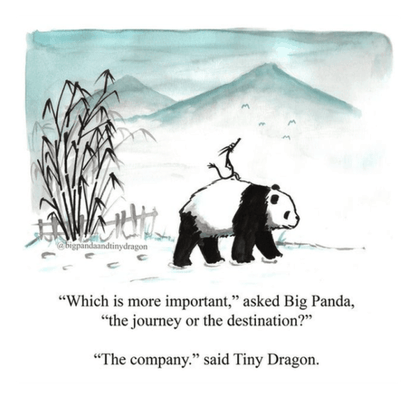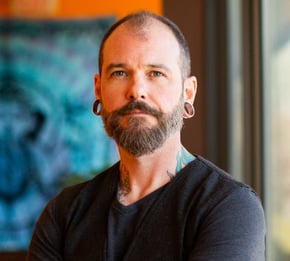Yoga began as a practice of renunciation. That is to say; classical yoga encourages one to disengage from what is seen as the traps of the material world: no family, no possessions, no attachments. As yoga evolved and blossomed into what we now call Tantra, the practice was no longer focused on renunciation of life but full engagement with it. This engagement focus acknowledges that if we want to be fulfilled, there are four aims of life that need our conscious, ethical, and balanced attention and participation.
Purusartha: purusa (the True Self, Soul, Spirit) artha (wealth, aims of life).
Dharma (The Purpose & Duty to Humanity)
The first of the four aims, dharma, is a word with a lot of meaning and is most likely the one you have heard before. Dharma in Buddhism is like cosmic law and order. I find this definition problematic because it reinforces the duality between the self and the “Universe.” The goal is to integrate self and others, so let’s explore this concept a little deeper.
At the macrocosmic level, it means morality. However, as BKS Iyengar states in Light on Life, “Moral values are susceptible to change over time and according to culture, place, and circumstance. Dharma is rather about the search for enduring ethical principles, about the cultivation of right behavior in physical, moral, mental, psychological, and spiritual dimensions. This behavior must always relate to the growth of the individual with the goal of realizing the Soul. If it does not, if it is culturally limited or warped, then it falls short of the definition of dharma…to stick to ethics is our human duty.”(pg.240)
On the microcosmic level, the individual dharma means duty. As in, “What is your life's purpose?” not what does ego want or desire from life, for it will always seek pleasure and gratification. But rather, why did the universe become you? What is your role in the big picture? What is the universe trying to do as you, through you? Figuring this out is part of the game of learning we are all playing. Through this game, the universe reveals itself to itself. That's the game. The universe is essentially playing peek-a-boo with itself! Meditation practices teach us to move past the mental chatter of desire to connect with, listen to, and trust that silent inner knowing that tugs the soul in the “right” direction, which is often a very different direction than hope and fear point to.
Moksha (Spiritual Liberation)
The second of the four aims, moksha, points us to liberation, spiritual freedom, or what might be called enlightenment. The desire for moksha is honestly the only “desire” that doesn't guide us toward suffering but guides us to freedom.
Georg Feuerstein states in The Deeper Dimension of Yoga, “All forms, branches, or schools of Yoga have the same final goal: Liberation, enlightenment, freedom, the transcendence of the human condition, or the fulfillment of our highest potential…How liberation, or enlightenment, is to be understood differs from system to system. All schools of Yoga are in unanimous agreement that liberation, or freedom, is the most worthwhile pursuit to which we could dedicate ourselves.” (pg.372)

As Iyengar further suggests in Light on Life, I’d like you to think of Dharma and Moksha as the tall banks that guide a flowing river. “The river of love, pleasure, and wealth flows between these guiding banks.” (pg.238)
Artha (Material Wealth)
Artha (wealth) and Kama (relationship) are the flowing rivers of life between these tall banks. It is acknowledged in this system that wealth, financial success, and the ability to support oneself and provide for those that one chooses are necessary for a life of fulfillment. Our interpersonal relationships are necessary and an acknowledged piece of the fulfillment paradigm. How we conduct our business and how we interact in our relationships must always be guided by Dharma and Moksha.
Remember what Asana teaches us: Balance in all things. This is the key to the middle way—moderation in all things, including moderation. So we engage in the game of Artha (wealth). We pursue careers and businesses that give our life purpose, goals, accomplishments, etc. We can care for ourselves within the societal framework; we have the resources to do the things we want to do and help others that we choose.
In this way, this behavior relates to the growth of the individual with the goal of realizing the soul, so it is guided by Dharma. If we pursue artha unbalanced, ignoring dharma as a guide, we may remain in a career that does not help us realize the soul. We risk losing perspective and slipping into greed. In the worst cases, we could take advantage of and even harm others for profit.
Questions to ask yourself:
- Are you engaging artha for the betterment of ourselves and all sentient beings? What is the guiding ideal? Dharma and moksha? Or something else?
- Are you limiting your ability and capacity to grow your wealth because you aren’t in the right relationship with it?
- Do you feel it is dirty or somehow greedy to want the ease that a degree of wealth brings? I add this because I think there is a flip side to doing the right things. That is, people will play very small, to the point of suffering, because they have a negative belief about wealth. That belief is that only the greedy, self-absorbed, or the bad have it. That to be poor is somehow more spiritual or pious. This sentiment lingers on from the history of renunciation in yoga.
I heard someone say once, “Money can’t buy happiness… yeah, that's bullshit. Tell that to a homeless person!” The point is money will meet a certain amount of our needs, and meeting those needs provides a certain degree of satisfaction and happiness. The “trap” is the belief that money can fulfill all our needs and solve all problems. The Truth is that once it has met the needs that it can, that’s it, it's done. More money will not equate to more happiness after a certain point.
Kama (Relationships)
Kama (relationship), of course, is all mixed up and intertwined with artha. Business is relationships. However, we all have relationships outside our business as well. Friends, family, and lovers are all important to a life of fulfillment. If our relationships are guided by moksha (freedom), they will also align with dharma because they serve the betterment of all souls involved. If moksha is our focus for ourselves and our loved ones, it will truly be love, not attachment (aparigraha).
Attachment is, unfortunately, what most people mistake for love. Attachment serves the ego and, by definition, puts oneself into bondage, where one limits or diminishes oneself to please or comfort another. Whereas love supports and encourages one to embrace and integrate all aspects of oneself into a comprehensive whole, which is moksha (liberation from suffering).
Questions to ask yourself:
- Do you want your kid to play soccer because they are fulfilled by it? Or is that your dream?
- You want your kid to be a doctor. Why? Because it will serve them, or you?
- Maybe you want your spouse to do that diet plan because they struggle with self-image. In actuality, they are perfectly healthy as they are, and what their self-esteem needs is your attention on them being perfect just as they are.
Dharma and Moksha are tall, strong banks that easily allow for the river to rise and fall. The river of Artha and Kama may become turbulent or run smooth, but Dharma and Moksha guide its flow. Iyengar again, “One way to sum up the four aims of life would be to say that provided you behave ethically on the one hand, surrender to God on the other, between these two, you will Love, Labor, and Laugh.” (pg.239)  My dharma is teaching, and I’m in business to help others. Moksha for myself and everyone else is my motivation to do this. I live a pretty modest life, but I always have what I need when I need it, which feels wealthy to me. Would I like more? Sure I would! That’s why I’m still playing the game, but at the end of the day, moksha, not artha, is what motivates my work. To me, kama is the rasa (flavor) of life. Relationships mean so much to me. You can be going through the worst times with the right people, and it’s actually the best. What should be the best times with the wrong people is actually awful.
My dharma is teaching, and I’m in business to help others. Moksha for myself and everyone else is my motivation to do this. I live a pretty modest life, but I always have what I need when I need it, which feels wealthy to me. Would I like more? Sure I would! That’s why I’m still playing the game, but at the end of the day, moksha, not artha, is what motivates my work. To me, kama is the rasa (flavor) of life. Relationships mean so much to me. You can be going through the worst times with the right people, and it’s actually the best. What should be the best times with the wrong people is actually awful.
If you’re interested in joining a community of like-minded people pursuing fulfillment (kula), check out Burning Wheel Yoga School’s Yogic Life Program.
May our Kula be a blessing to all beings and to being itself, Om gam Ganapataye Namaha! 🙏

.png?width=317&height=200&name=burningwheel%202_WIP%20(1).png)
